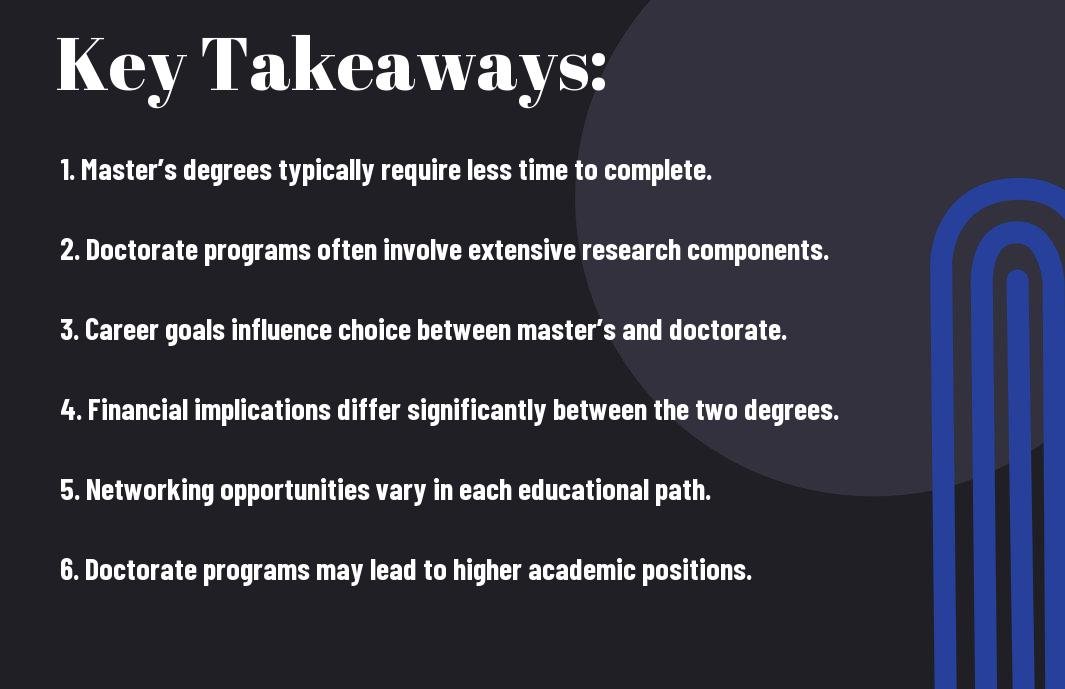Masters And Doctorate Programs In Education Just as many educators consider enhancing their professional standing, they often face the challenge of deciding between a Master’s and a Doctorate in Education. Each path offers unique opportunities and requirements that can significantly influence their career trajectory. While a Master’s degree typically prepares individuals for advanced practice and leadership roles, a Doctorate program explores deeper, fostering a robust analytical and research-oriented skill set. Understanding these distinctions allows them to make informed decisions about which degree aligns with their career goals and personal aspirations.

Key Takeaways: Masters And Doctorate Programs In Education
- Program Length: Masters programs typically require 1-2 years to complete, whereas Doctorate programs can take 3-7 years depending on research and dissertation requirements.
- Career Outcomes: A Masters degree often leads to advanced positions in education or specialized roles, while a Doctorate opens doors to academic and high-level administrative positions.
- Focus Areas: Masters programs usually emphasize practical skills and applications, while Doctorate programs concentrate on research, theory, and contributing original knowledge to the field.
- Cost and Funding: Doctorate programs tend to be more expensive but may offer funding opportunities such as assistantships, which are less common for Masters programs.
- Commitment Level: Pursuing a Doctorate requires a greater commitment in terms of time, research, and personal investment, making it vital to assess your long-term goals.
Overview of Advanced Degrees in Education
To provide a comprehensive understanding of advanced degrees in education, it is vital to explore the distinct characteristics of Master’s and Doctorate programs. These degrees represent significant milestones in the educational landscape and serve different purposes and outcomes for aspiring educators and administrators.
- Master’s Degrees
- Doctorate Degrees
- Key Differences
| Degree Type | Focus and Purpose |
|---|---|
| Master’s Degree | Designed for specialized knowledge in a specific area of education. |
| Doctorate Degree | Aimed at research, leadership, and advanced theoretical understanding. |
Definition of Master’s Degrees
To understand Master’s degrees in education, they are often structured to deepen knowledge in specific educational fields such as curriculum design, educational leadership, or special education. Typically, these programs require a bachelor’s degree for entry and consist of coursework, practicum experiences, and often a capstone project or thesis. They can enhance teaching skills, open up leadership opportunities, and are frequently pursued by those looking to advance their careers within their current roles.
Additionally, students pursuing a Master’s degree often balance their studies with professional responsibilities. This degree can empower educators to implement innovative practices and to address various educational challenges effectively. With emphasis on adaptable learning and practical applications, Master’s programs serve as a pivotal step for individuals aiming for expertise in education.
Definition of Doctorate Degrees
Education in Doctorate degrees in education primarily focuses on creating scholarly leaders capable of contributing significant research and powerful innovations to the field. These programs are generally more rigorous than Master’s programs and include the completion of a research dissertation or project that can impact educational theory or practice. Doctoral candidates are expected to engage in extensive study and participate in academic discourse at a high level.
Graduates from these programs often pursue positions as university faculty, researchers, or education administrators who influence policy. They are seen as authorities in their fields, exploring complex issues affecting education systems and contributing to the development of new educational frameworks. Doctorate programs thereby represent the highest level of academic achievement in education.
But achieving a Doctorate degree also involves a significant commitment of time, energy, and financial resources. It typically requires several years of study beyond the Master’s degree, and candidates may encounter challenges in conducting original research, requiring dedication and perseverance throughout the process.
Key Differences Between Masters and Doctorate Programs
Education should consider the key differences between Master’s and Doctorate programs in education, as they cater to different professional goals and outcomes. Master’s programs prioritize practice and application of knowledge, often preparing graduates to excel in instructional or administrative roles. Conversely, Doctorate programs focus on generating new knowledge through research and scholarly inquiry, thus preparing graduates for leadership and teaching positions at the university level.
Furthermore, the expectations for engagement, time commitment, and outcomes differ considerably between the two. Master’s candidates typically engage in course-based learning, while Doctorate candidates must devote themselves to independent research and scholarly contributions. The decision to pursue one over the other will depend on individual career aspirations and personal interests in the field of education.
Programs will not only vary in their structure and requirements but also in the influence they hold in the education sector. Graduates from programs, especially those with Doctorate degrees, may have access to advanced career opportunities and the ability to influence educational policies and practices on a broader level.

Purpose and Goals of Advanced Degrees
Now, individuals pursuing advanced degrees in education often do so with a clear set of objectives in mind. Understanding the purpose and goals of such programs can help prospective students align their aspirations with the right educational path. Below is a breakdown of key areas typically addressed by these degree programs:
Areas of Focus
| Master’s Degree Goals | Doctorate Degree Goals |
| Enhance practical skills for immediate application. | Contribute original research to the field. |
| Prepare for specific administrative or teaching roles. | Develop expertise for educational leadership or academia. |
| Expand knowledge of current educational practices. | Influence educational policy and reform. |
Career Advancement Opportunities
After obtaining advanced degrees, individuals often find themselves presented with greater career advancement opportunities. A Master’s degree may lead to roles such as curriculum designer, educational consultant, or administrative positions within schools. Furthermore, the knowledge gained can significantly broaden their professional network and facilitate collaboration with peers in the field.
In contrast, those who pursue a Doctorate can access high-level leadership roles, such as university professor or district superintendent. The expertise and research experience gained through a Doctorate often prepare them to take on positions that shape educational policy at local, state, or national levels, thus allowing them to effect change on a broader scale.
Research and Academic Contributions
Across the landscape of education, research plays a vital role in informing best practices and policy decisions. Individuals who obtain advanced degrees often engage in rigorous research activities, contributing to the field’s body of knowledge. A Master’s degree may empower educators to implement evidence-based strategies in their classrooms, while a Doctorate often signifies the capability to conduct independent research and publish findings in academic journals.
In fact, the contributions made by those with advanced degrees can influence not only their immediate educational environments but also the broader educational discourse. Research conducted by Doctorate holders often guides innovative practices and reforms, far beyond the academic community. This kind of academic contribution must be viewed as significant—individuals are not just enhancing their own practice, but are also amplifying the collective understanding of teaching and learning processes.
Personal Growth and Development
Goals surrounding personal growth and development take on varied forms during the pursuit of advanced degrees. For many individuals, these academic journeys foster a deeper understanding of educational theories and concepts, stimulating critical thinking and reflective practices. Engaging with diverse educational philosophies can profoundly impact how they perceive their roles in education and the learning experience of their students.
Moreover, pursuing higher education challenges individuals to push their limits and enhances their resilience. They may face demanding coursework, complex projects, and research components that require dedication and hard work. The skills developed during this process can lead to increased confidence, better problem-solving abilities, and a more profound sense of purpose in their professional endeavors.
Indeed, personal growth during the pursuit of an advanced degree extends well beyond academic achievements. It often cultivates lifelong learners who are equipped to navigate the complexities of modern educational landscapes with grace and effectiveness. He, she, or they will often find that their journey toward an advanced degree shapes not just their careers, but their personal philosophies as well, leading to holistic development in both their professional and personal lives.
Types of Master’s Programs in Education
Unlike many other fields, the educational landscape offers a variety of advanced degree options tailored to meet the distinct needs of aspiring educators. These programs serve various purposes, from enhancing pedagogy and improving administrative skills to specializing in a particular educational sector. Here are some prominent types of Master’s programs in Education:
| Master’s Program | Description |
|---|---|
| Master of Arts in Education | Focuses on educational theory and foundations. |
| Master of Science in Education | Emphasizes research, analytics, and scientific approaches. |
| Master of Education (M.Ed.) | Covers both practical skills and theoretical knowledge. |
| Specialized Master’s Programs | Offers focused training in niche areas such as special education or educational technology. |
| Online Master’s Programs | Flexible options that allow distance learning. |
Master of Arts in Education
Education often emphasizes a strong foundational understanding of pedagogical theories and practices in the Master of Arts in Education programs. These programs typically explore the philosophical aspects of education, enabling educators to reflect critically on their own teaching methods and educational beliefs. He or she may investigate into subjects such as curriculum design, educational psychology, and instructional strategies.
Additionally, this program often encourages collaboration and group learning, allowing students to share their experiences and insights. By engaging in this interactive learning environment, they can develop their unique educational philosophies, making them well-equipped for future roles in the education field. The combination of theoretical knowledge and practical applications is one of the defining features of the Master of Arts in Education.
Master of Science in Education
Against the backdrop of educational reform and evidence-based practices, the Master of Science in Education seeks to equip educators with the tools to analyze and apply research effectively. This program emphasizes methodologies, statistics, and data interpretation, making it ideal for those who aspire to take on research roles or drive policy changes. They may study areas such as educational assessment, program evaluation, and systematic inquiry.
Furthermore, this program prepares individuals for advanced roles in educational institutions and organizations that prioritize data-driven decision-making. Graduates can apply their analytical skills to improve instructional practices and promote student achievement.
Even though the Master of Science in Education may appear more technical than other programs, it provides a robust framework for addressing contemporary educational challenges. It fosters not just academic growth but also a learning environment that values inquiry and improvement.
Master of Education (M.Ed.)
Master of Education (M.Ed.) programs are designed to enhance the practical skills required for educational leadership. These programs often include a mix of coursework that applies theories directly to real-world challenges educators face. He or she can expect to engage in advanced studies of educational administration, curriculum development, and instructional practices, positioning them for leadership roles within schools or districts.
The M.Ed. also allows for a high degree of specialization, catering to those who wish to focus on specific areas such as literacy, early childhood education, or educational technology. Graduates are not only prepared to teach effectively but also to develop and implement programs that can transform educational environments.
For instance, when graduates pursue specialized tracks within the M.Ed., they can address particular needs in educational settings, such as improving reading skills among elementary students or implementing technology in classrooms. This specialization often results in enhanced employability and positions them as leaders in their selected fields.
Specialized Master’s Programs
An increasing number of institutions offer Specialized Master’s Programs within the field of education, catering to niche professions and interests. Programs might focus on areas like special education, adult education, or educational technology, ensuring that they meet the specific needs of diverse learners and educational environments. They are ideal for educators seeking to specialize and make substantial impacts in particular areas.
Moreover, these programs not only enhance content knowledge but also equip educators with the tools needed to address real-world challenges in their chosen disciplines. The expertise gained can lead to more effective instructional methodologies and improved educational practices.
Education professionals considering these specialized programs can significantly elevate their career prospects while making meaningful contributions to their field. With a targeted focus, they can adapt to the evolving landscape of education like never before.

Types of Doctorate Programs in Education
After considering the numerous paths available in the field of education, prospective students often find themselves evaluating various types of doctorate programs. Each program offers unique benefits and caters to different career aspirations. Below, they can see a breakdown of common types of doctorate programs in education.
| Type of Doctorate | Description |
|---|---|
| Doctor of Philosophy (Ph.D.) in Education | Aimed at research and academic positions, focusing on contributing original knowledge to the field. |
| Doctor of Education (Ed.D.) | Designed for leaders in education who want to apply research to practice and drive systemic change. |
| Educational Doctorates in Specialized Fields | Focused programs that tailor education and training for specific areas such as curriculum development or higher education. |
| Doctor of Philosophy (Ph.D.) in Education | Generally emphasizes theoretical frameworks and advanced research methodologies. |
| Doctor of Education (Ed.D.) | More practice-oriented, focusing on applying research and theories to real-world education problems. |
Doctor of Philosophy (Ph.D.) in Education
At its core, the Doctor of Philosophy (Ph.D.) in Education is geared towards those who aspire to engage deeply with educational theory and research. Candidates in this program typically conduct extensive literature reviews, develop original research questions, and contribute new insights to the scholarly community. It prepares graduates for roles in academia, research institutions, and high-level policy-making positions.
They often assume various roles post-graduation, including university faculty positions, research directors, or consultants for educational organizations. The journey through a Ph.D. program is rigorous and demands a strong commitment to independent research, making it an excellent choice for those who thrive in academic settings.
Doctor of Education (Ed.D.)
Besides the Ph.D., the Doctor of Education (Ed.D.) focuses on practical application and leadership within the education sector. This program is ideal for educational administrators and practitioners who seek to implement effective strategies and drive systemic changes in education systems. They often work closely with other professionals and community stakeholders to influence policy and practices.
The Ed.D. program typically emphasizes experiential learning, allowing students to engage with real-world problems. Dissertations for Ed.D. candidates often involve case studies or action research, emphasizing practical solutions rather than purely theoretical inquiries.
For instance, candidates might develop innovative programs to improve student performance or create training modules for teachers. This direct link to practice equips graduates with the tools necessary to effectively influence and navigate educational environments.
Educational Doctorates in Specialized Fields
Specialized doctorate programs like Educational Doctorates in Specialized Fields focus on niche areas within education. These fields may include curriculum development, higher education administration, or advanced literacy studies. He, she, or they pursuing these programs can expect targeted coursework and research opportunities tailored to specific interests within the educational landscape.
Also, these specialized programs prepare graduates for distinct roles in education, allowing them to become experts in their chosen areas. They are generally designed for individuals who seek to develop expertise that aligns with their career goals, making them attractive options for those looking to make a significant impact in specialized educational realms.
Assume that he or she is considering their next academic step; understanding these doctorate types is vital for choosing the right path to advance their career in education.
Admission Criteria and Program Structure
Keep in mind that admission criteria can vary significantly between institutions, making it vital for candidates to carefully review each program’s specific requirements. In general, aspiring students can expect a set of criteria designed to assess their academic background, professional experience, and readiness for advanced study.
Admission Requirements for Master’s Programs
An applicant typically needs to hold a bachelor’s degree from an accredited institution to be eligible for admission to a master’s program in education. Institutions may also require a minimum GPA, which often ranges between 2.5 and 3.0, as well as standardized test scores from the GRE or MAT, depending on the program’s guidelines. Many programs also consider letters of recommendation, personal statements, and relevant work experience, emphasizing the importance of practical involvement in the field of education.
In addition, candidates might be asked to participate in interviews or submit a portfolio of their work, particularly in specialized programs such as educational leadership or curriculum development. This comprehensive approach not only helps programs assess the applicant’s qualifications but also their passion and commitment to education.
Admission Requirements for Doctorate Programs
Programs at the doctoral level often demand a more rigorous set of admission standards, reflecting the advanced nature of research and scholarship expected of students. Applicants usually must hold a master’s degree in education or a related field, accompanied by a strong academic record. Many institutions may also require submission of GRE scores, particularly for more research-intensive programs, in addition to letters of recommendation and a well-crafted statement of purpose.
With the emphasis on research and leadership capabilities, many doctorate programs also expect candidates to possess prior professional experience in education. This combination of academic excellence and practical experience is vital for successful engagement in the complex educational landscape that doctoral candidates will encounter.
Typical Course Structures for Master’s Programs
By exploring typical course structures, candidates will find that master’s programs in education generally feature a blend of core courses, elective courses, and practical experiences. Core courses often focus on foundational theories in education, assessment strategies, and instructional design, providing a broad knowledge base vital for success in various educational settings. Elective courses allow students to tailor their studies to specific areas of interest, such as special education, leadership, or curriculum development.
Considering the increasing importance of hands-on training, most master’s programs also incorporate a practicum or internship requirement. This practical experience gives candidates an opportunity to apply their knowledge in real-world contexts, working under the guidance of seasoned educators and administrators. Through these experiences, students can refine their skills and establish professional networks.
Typical Course Structures for Doctorate Programs
Typical course structures for doctoral programs in education often include a combination of advanced seminars, research courses, and comprehensive examinations. The journey typically begins with a series of core and elective courses that focus on both theoretical foundations and practical applications of educational research. As students progress, they engage in dissertation research, which serves as a capstone to their academic experience and contributes original knowledge to the field.
Admission to doctorate programs usually requires an understanding of research methodologies, data analysis, and educational policies. This structure not only prepares candidates for their dissertation projects but also equips them with the necessary tools to influence educational systems significantly. Doctorate students typically spend considerable time working on their research proposals and gather data to address pressing issues in education.
Duration of Programs
Masters programs in education generally take one to two years to complete, depending on whether the student is enrolled full-time or part-time. Many institutions offer flexible scheduling options to accommodate working professionals, enabling them to pursue their master’s degree while balancing their career responsibilities. Students need to consider the time commitment required for internships and final projects, as these can extend the overall duration of their studies.
Criteria for doctoral programs generally span three to five years, largely contingent on the student’s pace and the nature of their dissertation research. The timeline can be influenced by whether the candidate is full-time or part-time, the data collection process, and how quickly they advance through coursework and exams. Students are encouraged to remain organized and committed to their studies to make timely progress through their programs.
Financing Advanced Education
Despite the increasing importance of advanced degrees in enhancing professional qualifications, navigating the financial component of pursuing such an education can be quite challenging. Individuals often find themselves facing hefty tuition bills, along with other associated costs. Thus, understanding various financial strategies becomes crucial for prospective graduate students in education.
- Tuition Costs
- Financial Aid
- Scholarships
- Return on Investment
| Cost Factors | Description |
|---|---|
| In-State vs. Out-of-State Tuition | Tuition rates can vary significantly based on residency status, impacting total expenses. |
| Program Length | The duration of the program will directly influence the total tuition and living expenses incurred. |
| Additional Fees | Students should also account for fees beyond tuition, such as technology fees, textbooks, and materials. |
| Cost of Living | Where a student chooses to study can greatly affect their overall financial commitment. |
Understanding Tuition Costs
After compiling information about tuition costs, it becomes clear that they are influenced by several factors. In-state students often pay significantly lower rates than those from out-of-state, which can create disparities in affordability. Additionally, the length of the program can lead to varying overall expenses, as longer programs typically result in higher tuition.
Furthermore, applicants should be aware of additional fees that may not be included in the base tuition price. These may encompass technology fees, lab fees, and anything else that could accrue during their studies. By evaluating these factors, students can make informed decisions about which program offers the best value for their financial investment.
Financial Aid and Scholarships
Around 70% of graduate students rely on some form of financial aid or scholarships to support their educational pursuits. Various options exist, including federal and state loans, grants, and leader-specific scholarships aimed at students pursuing education. Applying for financial aid often requires submitting specific forms, such as the Free Application for Federal Student Aid (FAFSA), which can open doors to potential funding opportunities.
In addition to loans, many universities offer tailored scholarships based on academic achievements, professional experiences, or even specific research interests. Prospective students should diligently research these programs, as they can greatly reduce the financial burden of advanced education.
Considering the wealth of opportunities available, it’s vital for students to approach the financial aid process strategically. They should explore all potential funding sources, which can significantly alleviate their financial obligations. Notably, keeping track of deadlines and requirements for scholarships is crucial for maximizing chances of receiving aid.
Return on Investment Considerations
Advanced degrees often come with considerable expense, prompting scholars to weigh the potential return on investment. They must consider potential salary increases, career advancement opportunities, and long-term job stability in their field. Oftentimes, graduates with advanced degrees find themselves in higher-paid positions, enabling them to recoup their educational investments over time.
Furthermore, a thorough analysis of how an advanced degree aligns with one’s career aspirations can shed light on its value. If the anticipated benefits such as promotions and salary growth outweigh the costs incurred, then pursuing higher education could be a financially sound decision.
The importance of a sound financial strategy cannot be overstated. Evaluating potential financial aid sources, tuition costs, and the projected returns of an advanced education will provide a clearer picture of what lies ahead for students as they commence on their educational journeys.
Career Outcomes and Impact
All individuals considering advanced degrees in education must reflect on the potential career outcomes and the impact those degrees may have on their professional paths. Whether pursuing a master’s or a doctorate, the choices made can significantly influence job opportunities, earning potential, and long-term career trajectories. This chapter will explore these outcomes in detail.
Job Opportunities for Master’s Graduates
Opportunities for master’s graduates in education are plentiful, as they often serve in necessary roles within educational institutions. Typically, individuals with a master’s degree can find positions such as educational administrators, school counselors, or instructional coordinators. These roles not only require advanced knowledge but also the ability to lead and implement educational programs effectively.
Moreover, master’s graduates may also work in specialized areas such as curriculum development, educational technology, or adult education. As they bring valuable skills to their positions, they often contribute to enhancing the overall quality of education within their institutions, thus enhancing their employability and job security.
Job Opportunities for Doctorate Graduates
Across the spectrum of higher education, doctorate graduates are presented with a wide array of job opportunities. These individuals typically have the credentials to lead academic departments, undertake research roles, or take on administrative positions at the district or state level. With a Ph.D. in education, they become thought leaders, influencing policy and contributing to scholarly discourse.
Consequently, those who earn a doctorate stand to gain recognition in their fields, often leading to professorships at universities or influential positions in educational research organizations. Their expertise is sought after for various projects, including policy development, curriculum design, and educational reform, facilitating their impact on broader educational landscapes.
Long-Term Career Impact of Advanced Degrees
Beside immediate job opportunities, advanced degrees in education also have a profound long-term impact on a professional’s career trajectory. Individuals with master’s degrees typically find themselves in a robust job market that values their added expertise. They foster professional networks, opening doors to collaborations and mentorship opportunities that could enhance their careers.
- Higher earning potential
- Greater job stability
- Opportunities for leadership roles
- Increased professional recognition
- Ability to influence educational policy and reform
Long-Term Benefits of Master’s vs. Doctorate Degrees
| Master’s Degree Outcomes | Strong job market presence, immediate leadership roles, increased salary relative to bachelor’s degree holders. |
| Doctorate Degree Outcomes | Access to high-level administrative positions, influential in shaping educational policy, potential for substantial increases in salary and job prestige. |
Further, the long-term impact of pursuing advanced degrees can include the ability to contribute significantly to the field of education through research, innovation, and practice. Individuals equipped with advanced degrees often find themselves becoming contributors to national and international educational discourse, advocating for enhanced educational practices and policies.
- Leadership opportunities in educational institutions
- Contributions to research and educational integrity
- Ability to develop and influence new curricula
- Enhanced personal satisfaction in career achievements
- Networking with other advanced professionals
Long-Term Career Growth Opportunities
| Career Growth for Master’s Graduates | Most often leads to roles such as department heads or lead teachers and active participation in local educational initiatives. |
| Career Growth for Doctorate Graduates | Often leads to positions such as university faculty, researchers, or policy consultants, wielding significant influence over educational practices. |
In the final consideration, while both master’s and doctorate programs in education provide valuable skills and experiences, they serve different purposes on a professional level. Thus, individuals must thoughtfully weigh their options based on their career ambitions and the impact they wish to have within the field of education.
Also Read: Maximize Your Learning – The Best Online Courses For College Credit In 2023
To Wrap Up
Considering all points, individuals pursuing an advanced degree in education must carefully evaluate the differences between Master’s and Doctorate programs. A Master’s degree typically focuses on enhancing practical skills and knowledge, preparing graduates for leadership roles within educational settings or specialized areas such as curriculum development or educational technology. In contrast, a Doctorate program emphasizes research and theoretical frameworks that can lead to academic careers or high-level administrative roles. They equip graduates with the tools necessary to influence educational policies and contribute significant advancements within the field.
Ultimately, the decision between a Master’s and a Doctorate in education should align with their personal career goals, interests, and commitments. They must consider the time, resources, and outcomes associated with each path. Those who aim for immediate application of advanced knowledge may find a Master’s program to be more appropriate, while individuals who desire to engage in scholarly research and shape future generations through academic leadership may be better suited for a Doctorate. By understanding these distinctions, they can make an informed choice that best supports their professional aspirations in the expansive realm of education.
FAQs
Q: What is the main difference between a Master’s and a Doctorate program in education?
A: The primary difference lies in the focus and depth of study. A Master’s program typically provides advanced knowledge and practical skills for professional practice, while a Doctorate program emphasizes original research, theory development, and leadership in the field. Those pursuing a Doctorate engage in a deeper exploration of educational issues and contribute new insights to academic literature.
Q: How long does it typically take to complete a Master’s degree compared to a Doctorate in education?
A: A Master’s degree in education usually takes about 1 to 2 years of full-time study to complete, depending on the program and whether the student is attending part-time. In contrast, a Doctorate program often requires 3 to 5 years or more, depending on research requirements, dissertation work, and the student’s pace in progressing through the coursework.
Q: What career opportunities are available after earning a Master’s or Doctorate in education?
A: Graduates with a Master’s degree often pursue roles such as educators, administrators, instructional coordinators, or educational consultants. Those with a Doctorate typically qualify for higher-level positions such as university faculty, policymakers, educational researchers, or leadership roles in educational organizations. The level of education attained influences the scope of responsibilities and influence in the education sector.
Q: Are there specific prerequisites for enrolling in Master’s or Doctorate programs in education?
A: For a Master’s program, applicants usually need a bachelor’s degree and may be required to submit letters of recommendation, a personal statement, and standardized test scores (like the GRE, depending on the institution). Doctoral programs often require a Master’s degree, along with robust research experience, a clear research proposal, and strong academic and professional references to demonstrate readiness for advanced study and research work.
Q: What financial resources are available for students pursuing Master’s or Doctorate programs in education?
A: Financial support options vary by program and institution. Students pursuing a Master’s degree can explore grants, scholarships, and federal student loans. Those pursuing a Doctorate program may also qualify for assistantships, which can provide tuition waivers and stipends in exchange for teaching or research responsibilities. It’s advisable to investigate various funding opportunities early in the application process to effectively manage costs.



